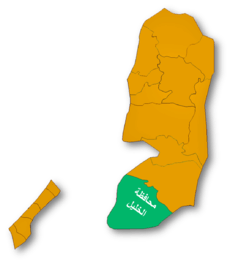Al Baqa
Al Baqa or Al Baqa'a, also spelled Al-Beqa or Al baqr, (meaning "The open valley")[1] is a Palestinian village located just east of Hebron. It has been occupied by Israel since 1967, together with the rest of the West Bank. It is sandwiched between the Israeli settlements Givat Harsina and Kiryat Arba. Wadi al-Ghrous or Wadi al Gruz is a locality of Hebron that borders Al Baqa on the west.
A Bedouin village with the name Al Baqa'a also exists some 11 kilometers southeast from Ramallah.[2]
Geography
Al Baqa is located in the heart of the Baqa'a Valley, a few kilometers east of Hebron City. It is sandwiched between the Israeli settlements Givat Harsina and Kiryat Arba. About half a kilometer west of the village lies the small locality Wadi al-Ghrous, separated by the bypass road 3507, which cuts across the village and connects the two settlements. Also a military outpost is located in between, adjacent to Road 3507.[3] To the north, Al Baqa borders Al Bowereh, separated by Givat Harsina. East of the village lie Sa'ir and Bani Na'im, separated by the Israeli bypass road Highway 60. Al Baqa is a rural area.[4]
Population
According to the 2007 Census, the total population of Al Baqa in 2007 was about 1,200. In 2011, the PCBS estimated the population at 1,369 people.[5] The populations of Al Baqa are mainly comprised from six families which are: Jaber family, Sultan family, Qamery family, Talhamey family, Al Natsha family and Da'na family.[4] Wadi al-Ghrous had some 65 families in 2005.[6]
Israeli occupation
Al Baqa and its neighbour Wadi al-Ghrous are heavily afflicted by the Israeli occupation. They are isolated from the rest of the West Bank by settlements, bypass roads, road blocks and separation barriers.[6] A significant part of their land is expropriated for the building of settlements and bypass roads. The settlers seek to take more Palestinian lands to integrate Givat Harsina and Kiryat Arba and form one big settlement bloc.[4][7][8]
Farming land and water resources
Palestinian residents and observers repeatedly reported attacks, demolitions and confiscations by settlers and military. On 29 October 2009, for example, settlers and Israeli Civil Administration employees leveled agricultural lands of Al Baqa'a, confiscated irrigation networks pipes, destroyed all the stone barriers and an irrigation pool. In the week prior to this attack, soldiers and settlers reportedly attacked Palestinian farmers in an attempt to prevent them from growing plants which are the main source of income for these people.[9] On 21 May 2012, Israeli forces, police and Mekorot workers destroyed crops and confiscated irrigation equipment. More than 13 dunums of agricultural land was destroyed.[8]
On 2 March 2011, Israeli troops destroyed three Palestinian water wells, one in Al Baqa and two in Wadi al-Ghrous. According to Israel they were built without the requisite permits.[10] On 22 October 2012, again a water well in Wadi al-Ghrous was destroyed[11]
References
- Palmer, 1881, p. 392
- OCHA, Protection of civilians weekly report, 20–26 July 2011.
- The Colony of Kharsina Expands on the Expense of the City of Hebron. POICA, 3 December 2008
- Al Baqa Village Profile. ARIJ, 2009
- Hebron Governorate Statistical Yearbook No. 3, tab. 4, p. 65. PCBS, 2011
- Special Focus: The Closure of Hebron’s Old City Archived 2014-08-02 at the Wayback Machine, p. 1. OCHA, Humanitarian Update, July 2005. On: Archived 2014-05-25 at the Wayback Machine
- HEBRON: Settlers seize 2000 dunams of Palestinian farmland around Givat HaHarsina. Jerry Levin, CPT, 21 January 2004
- Israeli Forces Destroy Crops, Seize Irrigation Equipment Archived 2014-07-14 at the Wayback Machine.WAFA, 21 May 2012
- New settlers attack on Al Baqa'a neighborhood Archived 2014-07-14 at the Wayback Machine. POICA, 6 November 2009
- Israel destroys wells near Hebron. AFP, 2 March 2011
- Israeli forces demolish water well in Hebron. Ma'an News Agency, 22 October 2012
Bibliography
External links
- Survey of Western Palestine, Map 21: IAA, Wikimedia commons
- Hebron Governorate Access Restrictions. Al Baqa on OCHA map, near coordinates F 23/24. Map available here.
- Northern border on Google Maps with the Givat Harsina settlement and Al Bowereh (Al-Bweireh). Al Baqa is below the blue line.
- Illegal Destruction of Water Cistern by Israeli forces. Video of destruction (on 2 May 2012), made by international observers/monitors
